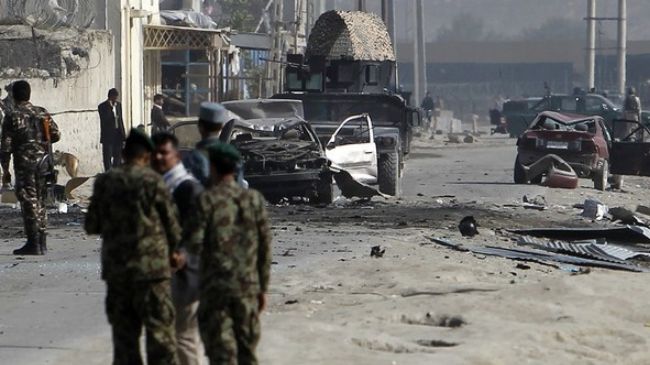Foreign Convoy and Compound Attacked In Kabul
Afghan security forces inspect the site of a car bomb attack in Kabul.

NEW DELHI: At least six people were killed and over 30 injured when a suicide attack hit a British Embassy vehicle on Kabul's Jalalabad Road.
The British embassy confirmed that one of its vehicles was attacked. "A British embassy vehicle was attacked. There are some injuries. We are working with Afghan authorities," a British embassy spokesperson said.
Ten hours later, a suicide bomber and two gunmen attacked a foreign guesthouse near the compound of the International Relief and Development Organization. The bomber detonated his bomb near the compound whilst the gunmen tried to enter Wazir Akbar Khan enclave, home to several embassies and nongovernmental and media organizations. The attack was thwarted by guards at the compound.
These are the latest in a string of deadly attacks across Afghanistan, several of which have targeted security forces. Attacks have, in fact, been increasing in frequency since the conclusion of the Afghan presidential elections and the signing of the Bilateral Security Agreement (BSA).
On Tuesday, a roadside bomb exploded in Kabul injuring seven Afghan National Army personnel. On the same day, a bombing on the Pakistan-Afghanistan border, which officials blamed on the Haqqani network, killed sixty-one and injured fifty others.
Earlier this week, a suicide bomber detonated his vest packed with explosives at amid a crowd of people who had gathered to watch a volleyball match, killing 45 in the attack in Afghanistan’s Paktika province.
The attack coincided with an agreement reached in Afghanistan’s parliament, on the same day, that allowed for US and NATO troops to remain in the country post 2014.
Last week, two days after Taliban fighters killed two security guards on the eastern outskirts of Kabul, officials say that they killed four Taliban suicide bombers during an attack on a compound housing foreign workers in the capital city.
The week before, a convoy of vehicles belonging to American-led coalition forces was attacked twice by Taliban gunmen. Although the convoy suffered no casualties, an Afghan civilian died in the attack. A few days before that in the same week, two separate bombings killed at least ten police officers, including a top commander. The bombings, in turn, followed an attack on the police headquarters in Kabul a day earlier that killed a senior police officer and injured six others. The explosion reportedly happened two hours after another explosion in Kabul, with news reports from the region quoting Defence Ministry Spokesman Mohammad Zahair Azimi saying that the earlier attack was on an Afghan army vehicle that resulted in no casualties.
Earlier, in October, six police officers and two civilians were killed in two separate attacks on the same day, a day after members of the Taliban ambushed a police convoy, leading to an hours-long gun battle in northern Afghanistan. Before that, in the same month, Taliban insurgents killed 22 security force members in Sar-e-Pol province north of Kabul, which in turn, followed a bomb in Kabul on the same day that killed one civilian.
A few weeks ago, although not claimed by the Taliban, a prominent female politician -- Shukria Barakzai -- narrowly escaped a suicide attack that killed three others.
Other recent attacks -- leading up to and during the Presidential elections -- include an attack that killed three soldiers belonging to the United States-led International Security Assistance Force (ISAF) in September, a suicide bombing that killed Karzai’s cousin Hashmat Khalil Karzai, the shooting of 15 civilians, two Finnish relief workers, an attack on the Kabul airport, and one of the deadliest attacks since 2001 wherein a sports utility vehicle detonated in a busy market in Paktika province, eastern Afghanistan, that killed 90 people.



